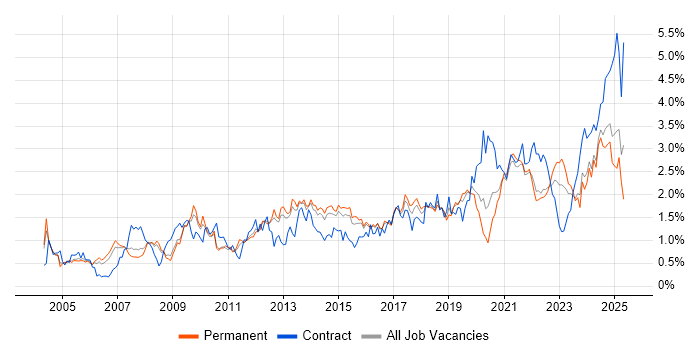Data Analysis
West Midlands > Birmingham
The table below provides summary statistics for permanent job vacancies advertised in Birmingham requiring Data Analysis skills. It includes a benchmarking guide to the annual salaries offered in vacancies that cited Data Analysis over the 6 months leading up to 29 May 2025, comparing them to the same period in the previous two years.
| 6 months to 29 May 2025 |
Same period 2024 | Same period 2023 | |
|---|---|---|---|
| Rank | 69 | 85 | 81 |
| Rank change year-on-year | +16 | -4 | +51 |
| Permanent jobs citing Data Analysis | 37 | 70 | 53 |
| As % of all permanent jobs advertised in Birmingham | 2.80% | 2.40% | 2.85% |
| As % of the Processes & Methodologies category | 2.93% | 2.99% | 2.96% |
| Number of salaries quoted | 23 | 51 | 30 |
| 10th Percentile | £42,500 | £40,000 | £26,250 |
| 25th Percentile | £44,375 | £50,000 | £30,625 |
| Median annual salary (50th Percentile) | £53,450 | £59,500 | £48,500 |
| Median % change year-on-year | -10.17% | +22.68% | +3.74% |
| 75th Percentile | £65,000 | £70,000 | £65,625 |
| 90th Percentile | - | £84,964 | £67,500 |
| West Midlands median annual salary | £53,450 | £50,000 | £39,250 |
| % change year-on-year | +6.90% | +27.39% | -7.65% |
All Process and Methodology Skills
Birmingham
Data Analysis falls under the Processes and Methodologies category. For comparison with the information above, the following table provides summary statistics for all permanent job vacancies requiring process or methodology skills in Birmingham.
| Permanent vacancies with a requirement for process or methodology skills | 1,263 | 2,341 | 1,791 |
| As % of all permanent jobs advertised in Birmingham | 95.61% | 80.31% | 96.39% |
| Number of salaries quoted | 676 | 1,888 | 1,337 |
| 10th Percentile | £32,500 | £32,000 | £32,315 |
| 25th Percentile | £42,500 | £40,988 | £42,625 |
| Median annual salary (50th Percentile) | £55,000 | £55,000 | £56,500 |
| Median % change year-on-year | - | -2.65% | +2.73% |
| 75th Percentile | £68,750 | £70,000 | £71,250 |
| 90th Percentile | £83,125 | £85,000 | £82,500 |
| West Midlands median annual salary | £52,500 | £50,000 | £52,500 |
| % change year-on-year | +5.00% | -4.76% | +5.00% |
Data Analysis
Job Vacancy Trend in Birmingham
Job postings citing Data Analysis as a proportion of all IT jobs advertised in Birmingham.

Data Analysis
Salary Trend in Birmingham
3-month moving average salary quoted in jobs citing Data Analysis in Birmingham.
Data Analysis
Salary Histogram in Birmingham
Salary distribution for jobs citing Data Analysis in Birmingham over the 6 months to 29 May 2025.
Data Analysis
Co-occurring Skills and Capabilities in Birmingham by Category
The follow tables expand on the table above by listing co-occurrences grouped by category. The same employment type, locality and period is covered with up to 20 co-occurrences shown in each of the following categories:
